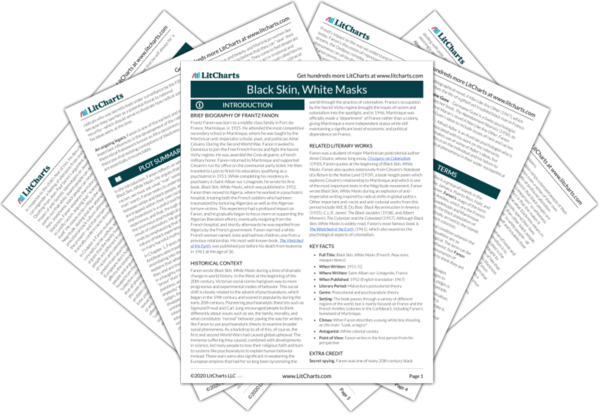Colonialism, Diaspora, and Alienation
In the broadest sense, Black Skin, White Masks is a book about the powerful effects of colonialism on life in the 20th century. Fanon examines colonialism’s impact on black as well as white people in both colonized (or formerly colonized) regions such as the Caribbean, and in the countries of the colonizers, such as France. While the 20th century saw the official end of most of the Western empires that controlled vast stretches of the…
read analysis of Colonialism, Diaspora, and AlienationMaterial vs. Psychological Oppression
Fanon, a psychiatrist, is concerned with understanding both the psychological and material (i.e., physical and economic) dimensions of colonialism. This approach to thinking about colonialism was revolutionary at the time of Fanon’s writing, when Western beliefs about the psychology of people of color tended to be crude, dehumanizing, and false. Indeed, Fanon points out repeatedly that white Western culture cannot begin to understand or describe black experience. Therefore, Fanon’s major achievement in Black Skin,…
read analysis of Material vs. Psychological OppressionKnowledge vs. Ignorance
Black Skin, White Masks is an academic text, written at the intersection of psychology, philosophy, history, and literary studies. Fanon is forthcoming about his own status as a highly-educated intellectual, but remains critical of the ways in which academic knowledge is entangled with the history of colonialism, not just because the academic worldview tended to be white- and Euro-centric, but because the work of academics has historically been used as justification for racism. On the…
read analysis of Knowledge vs. Ignorance
Self-Image and Self-Hatred
As noted in other themes, Fanon argues that colonialism has corrupted people’s understanding of themselves. Black people have an image of themselves that is distorted—a negative image constructed by white colonizers. Black people experience the weight of being “hated, detested, and despised” by white society. This leads to feelings of shame and self-hatred. Many black people try to become “more white” as a result, which only induces further shame due to the hopelessness of that…
read analysis of Self-Image and Self-HatredDesire, Aspiration, and Competition
Early in the book, Fanon argues that two questions are central to understanding the world: “What does man want?” and “What does the black man want?” The separation of these two inquiries emphasizes Fanon’s argument that black people are excluded from the category of humanity, and also conveys that there are important distinctions between the desires of white people and desires of black people. Following the conventions of psychoanalysis, Fanon maintains that desire must be…
read analysis of Desire, Aspiration, and Competition






